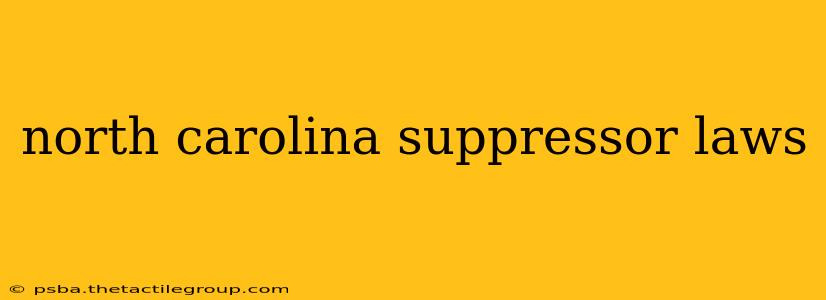Navigating the world of firearm regulations can be complex, and North Carolina's suppressor laws are no exception. This guide provides a comprehensive overview of the legal landscape surrounding suppressors, or silencers, in the Tar Heel State. Understanding these laws is crucial for responsible firearm ownership. Disclaimer: This information is for educational purposes only and should not be considered legal advice. Always consult with a legal professional for advice specific to your situation.
What are the Key Federal Regulations Regarding Suppressors?
Before diving into North Carolina's specific laws, it's essential to understand the federal framework. The National Firearms Act (NFA) of 1934 regulates the manufacture, transfer, and possession of suppressors, classifying them as National Firearms Act (NFA) items. This means:
- Registration: Suppressors must be registered with the Bureau of Alcohol, Tobacco, Firearms and Explosives (ATF).
- Tax Stamp: A $200 tax stamp is required for each suppressor.
- Background Check: A thorough background check is conducted before a suppressor can be legally transferred. This process can take several months.
North Carolina's Suppressor Laws: A State-Level Perspective
North Carolina law largely mirrors the federal requirements, adding no additional restrictions beyond those imposed by the NFA. This means that possessing a suppressor in North Carolina is legal, provided you comply with both federal and state laws regarding firearm ownership, registration, and licensing.
Key Points to Remember:
- Compliance with Federal Law: North Carolina residents must adhere to all federal regulations concerning suppressors. Non-compliance with federal law automatically renders any state-level compliance null and void.
- No State-Specific Restrictions: There are no state-level prohibitions against owning, possessing, or using a suppressor in North Carolina, beyond the limitations already established by the NFA.
- General Firearm Laws Apply: All other applicable state laws concerning firearm ownership, transportation, and usage apply to suppressors as well. This includes considerations regarding carrying concealed weapons, storage requirements, and specific locations where firearm possession is restricted.
Purchasing and Transferring Suppressors in North Carolina
The process of acquiring a suppressor in North Carolina is identical to the federal process:
- Find a Licensed Dealer: You must purchase a suppressor from a licensed firearms dealer who is registered with the ATF.
- Complete ATF Form 4: The ATF Form 4 is the application for tax payment and registration of a suppressor.
- Background Check: A thorough background check will be conducted.
- Tax Stamp: Pay the $200 tax.
- Waiting Period: Be prepared for a substantial waiting period, often several months, while the ATF processes your application.
- Take Possession: Once the ATF approves your application, you can take possession of your suppressor.
Understanding Common Misconceptions
Several misconceptions surround suppressors. It's crucial to dispel these to ensure responsible and informed ownership:
- Complete Silence: Suppressors significantly reduce the sound of a firearm, but they don't make it completely silent.
- Automatic Approval: The ATF background check and approval process is rigorous and takes time.
- Easy Acquisition: Acquiring a suppressor is a legally complex process requiring patience and attention to detail.
Conclusion
Understanding North Carolina's suppressor laws requires a careful review of both state and federal regulations. While the state itself doesn't add restrictions beyond federal mandates, full compliance with the NFA remains paramount. Responsible gun ownership includes knowing and respecting the relevant laws. Remember to always consult with a legal professional or a knowledgeable firearms expert for personalized guidance before purchasing or using a suppressor in North Carolina.

